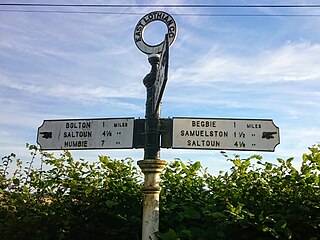Related Research Articles

Freyr, sometimes anglicized as Frey, is a widely attested god in Norse mythology, associated with kingship, fertility, peace, prosperity, fair weather, and good harvest. Freyr, sometimes referred to as Yngvi-Freyr, was especially associated with Sweden and seen as an ancestor of the Swedish royal house. According to Adam of Bremen, Freyr was associated with peace and pleasure, and was represented with a phallic statue in the Temple at Uppsala. According to Snorri Sturluson, Freyr was "the most renowned of the æsir", and was venerated for good harvest and peace.

In Norse paganism, Freyja is a goddess associated with love, beauty, fertility, sex, war, gold, and seiðr. Freyja is the owner of the necklace Brísingamen, rides a chariot pulled by two cats, is accompanied by the boar Hildisvíni, and possesses a cloak of falcon feathers. By her husband Óðr, she is the mother of two daughters, Hnoss and Gersemi. Along with her twin brother Freyr, her father Njörðr, and her mother, she is a member of the Vanir. Stemming from Old Norse Freyja, modern forms of the name include Freya, Freyia, and Freja.

In Norse mythology, Njörðr is a god among the Vanir. Njörðr, father of the deities Freyr and Freyja by his unnamed sister, was in an ill-fated marriage with the goddess Skaði, lives in Nóatún and is associated with the sea, seafaring, wind, fishing, wealth, and crop fertility.
Frei, Frey, Fray, Frej, Freij, Freyr or Freÿr may refer to:

Old Norse Yngvi[ˈyŋɡwe], Old High German Ing/Ingwi and Old English Ing are names that relate to a theonym which appears to have been the older name for the god Freyr. Proto-Germanic *Ingwaz was the legendary ancestor of the Ingaevones, or more accurately Ingvaeones, and is also the reconstructed name of the Elder Futhark rune ᛜ and Anglo-Saxon rune ᛝ, representing ŋ.

Gerdes, or Geerdes, is a surname of German origin. It is a patronymic name, i.e. it comes from "son of Gerhard". When around 1800 the Prussian government under French occupation decided to fix the surnames, the contemporary "son of Gerhard" had to keep his name. In Ostfriesland, the law was ignored until at least 1811.
Wagle is a surname that occurs in multiple cultures.
The name Ingvar is an Old Norse first name for men common in Scandinavia meaning "protected by Yngvi". The feminine version of the name is Inga.
Yngve is a Scandinavian male given name, mostly used in Sweden and Norway. It is the modern form of either Old Norse Yngvi or of Ingwin. Yngvi was the Old Norse name of the Germanic god Ingu-, later identified with Freyr, or of Ingwian- "belonging to the tribe of the Ingvaeones" (who were in turn named after Ingu-.
Alf is a given name, nickname and surname.
Dag is a masculine Scandinavian given name derived from the Old Norse dagr, meaning "day", most commonly used in Norway and Sweden. In Sweden, September 16 is Dag's Name Day. Dag is uncommon as a surname. People with the name Dag include:
Thorsten is a Scandinavian given name. The Old Norse name was Þórsteinn. It is a compound of the theonym Þór (Thor) and steinn "stone", which became Thor and sten in Old Danish and Old Swedish.
Haugaard and Haugard are surnames of Danish and Norwegian origin which derive from the Old Norse word haugr which can be translated to mean hill, knoll, or mound. Other derivatives include Hauge, Haugan, Haugen and Haugland.
Høgh is a Danish surname which was derived from the Old Norse word Haugr meaning a hill or mound.
Lyngstad is a Norwegian surname. Notable people with this surname include the following:
Ingersoll is a surname derived of the Old Norse words "Ingvar" or "Inger" and "sál", common words in found in modern Icelandic, Swedish and Norwegian.

The family name Begbie originates in south-east Scotland, where it is most common in the Edinburgh and East Lothian areas.
Bang is a Scandinavian surname as well as a Korean surname. The Scandinavian surname is derived from the Old Norse banga which means to pound or hammer. The Korean surname is cognate to the Chinese surname Fāng (方). Notable people with the surname include:
Alexandersson is a surname. Notable people with the surname include:
Bye is an English, Norwegian, and Swedish surname. Variations of the surname include By and Buy, among others. The English surname is derived from Middle English bye "bend". The Norwegian and Swedish surname is derived from a habitational name from any of various farms named By, from Old Norse býr "farm."